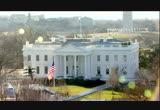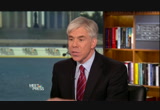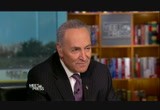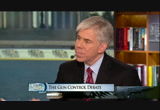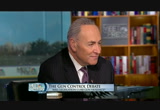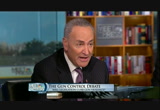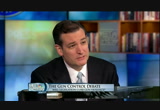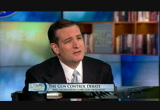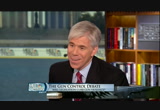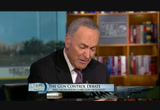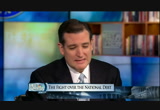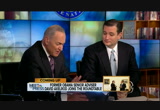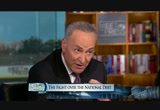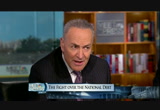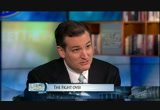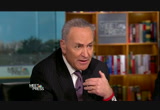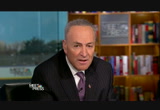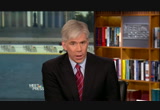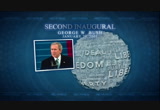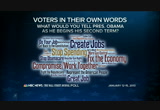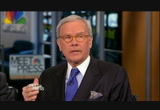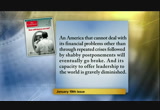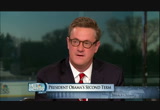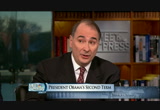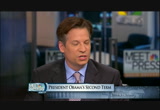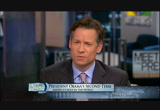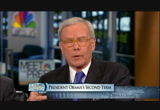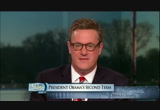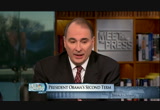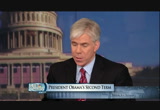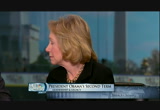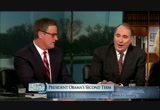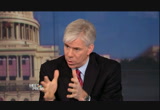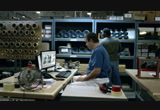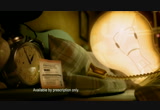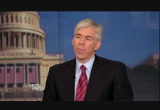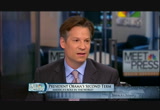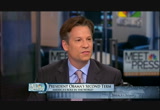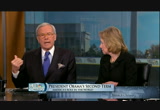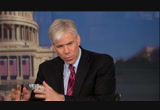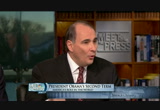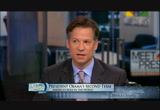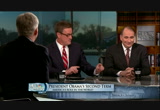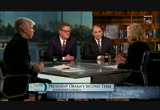tv Meet the Press MSNBC January 20, 2013 11:00pm-12:00am PST
11:00 pm
11:01 pm
from nbc news in washington, the world's longest-running television program, this is "meet the press" with david gregory. good sunday morning. this is inauguration day for president obama. the public ceremony is tomorrow. but according to the constitution, his second term officially begins today. moments ago the vice president was officially sworn in, and at noon today the president will take his official oath of office during a small private ceremony in the blue room of the white house. so the stage is set as well at the u.s. capitol for the inaugural address and public swearing in tomorrow.
11:02 pm
the president kicked off the weekend festivities yesterday with a day of service, and the first lady hosted a special concert for children of military families last night. >> this is what inauguration is all about. it's about celebrating who we are as americans and all the things that makes this country so great. and when i think about who we are, when i think about what makes america great, i think about all of you. >> on tuesday, it's back to work for congress, and there are two big issues that are going to dominate the beginning of the president's second term. guns and the nation's debt. joining me now to debate those issues, chuck schumer of new york and newly elected republican senator ted cruz of texas. welcome back as senator cruz to "meet the press." back to both of you. i want to start on the gun debate. because as i say, even before the second term is officially underway thissy is bait is well underway. here are the highlights of what the president wants to accomplish. universal background checks. he'd like to pursue a ban on
11:03 pm
high capacity magazines. an assault weapons ban that lapsed in 2004. and he'd like stricter laws on gun trafficking. but senator schumer, just as i challenged wayne lapierre of the nra very hard when this came up, i challenge you as well with a question of, is this really going to make a difference? and rich lawry wrote something that caught my attention in "the national review." no one can write a law against mothers owning guns that one day might be turned against them by deranged sons who then commit horrific acts of murder-suicide. shooting rampages are hard to prevent because they are so often committed by young men with no criminal records who want to die. these are adult facts that don't intrude on the childish world of white house policy making. he notes adam lanza in newtown, his own mother of course passed a background check. >> here's the bottom line. these laws are not perfect. and you'll always find certain exceptions. but they make a huge difference.
11:04 pm
every major person who has studied the brady law, which is the most significant gun safety law we've passed in the last 20 years has said it has reduced gun violence dramatically. law enforcement is totally for the brady law. and the idea that felons or people who are mentally infirm or people who are spousal abusers should be allowed to buy guns, most everyone agrees on that, even -- >> but there's no overwhelming evidence of the assault weapons ban dramatically reduced this incident of violence, nor was there an uptick in this sort of violence once the law lapsed. >> during the 10 years that the assault weapons ban was in effect, the use of those weapons in crime went down a significant percent an. >> senator, is there any gun regulation, any restriction of gun rights, you could accept or vote for? >> sure. i think the fact that we have background checks with people buy firearms and we prevent felons and those with serious mental illness acquiring them,
11:05 pm
those make perfect sense. >> so a background check is something you could support? >> well, the background checks are in place when a licensed firearms dealer sells firearms. and there's a lot of room for improvement -- >> but 45% of sales are citizen to citizen. that's the loophole we talk about. >> that statistic is pretty bogus. it's based on a study before the background checks were put into place. so that study is highly questionable, that 45%. >> wayne lapierre never questioned that study when i brought up that point. he questioned feasibility and collecting records, but still there is a loophole that a lot of people would like to correct. >> there actually isn't the so-called gun show loophole. that doesn't exist. any licensed firearm dealer who sells at a gun show has to have a background check. it's a requirement that applies to every licensed firearm dealer. what it doesn't apply to is personal sales one-on-one. and that's true at a gun show or not. >> is this most likely the area
11:06 pm
of agreement? >> i would say this is the sweet spot in terms of actually making us safer and having a good chance of passing. this is it. right now, i'm the author of a universal background check bill. i am talking to pro gun democrats -- excuse me -- and republicans. and i think you're going to see very likelihood in the next week or two a proposal that has broad support for universal background checks. and i would say this to my friend ted. if you are a -- someone who's not a felon, you go into a gun store, a registered firearm dealer and buy 20 guns, which you can, they'll do a background check out, you can sell them to anyone you want, felon or anybody else. so there are huge holes in this law. and i would say this. the last time we made progress on the pro gun safety side was tightening up this law for mentally ill people in 2007. i carried the law, and the nra actually doesn't oppose it. i think we have -- this is the best chance of getting something done, and i think you're going to find much broader support
11:07 pm
than we've ever imagined. >> it's interesting, senator cruz. the president said to those americans who live in states like your own where there are very strong gun rights representatives, you're the ones who have to rise up and pressure those senators and congressmen to demand an assault weapons ban, a ban on magazines. and i wonder if the national rifle association has helped his cause with an ad that was released this week that talked about armed security guards, the president skeptical those could work, did not rule it out. but talking about the president's children and that issue of security. watch a portion of that ad. >> are the president's kids more important than yours? then why is he skeptical about putting armed security in our schools when his kids are protected by armed guards at their schools? >> over the line? >> look, i'm going to let people to decide to run what ads they want. i do think there's a fundamental point here, and there is a point of hypocrisy when it comes to gun control. that many of the proponents of gun control are very wealthy,
11:08 pm
live in communities where they can outsource police protection. but you have a lot of people that are worried about preserving the safety of their own home. if you're talking to a single woman living in annacostia, who has the misfortune to live next to a crack house, to hell her she doesn't have a constitutional right to keep and bear arms i think is fundamentally wrong. >> this is a narrower point about armed guards in school. this ad is factually inaccurate. the president's children are protected by the secret service, and that's not their own choice. you're trying to make a broader point, which i understand. but you think this is constructive to move the public debate forward? >> what i don't think is constructive is what the president is doing right now, which is within minutes of that horrible tragedy in newtown, the president began trying to exploit that tragedy to push a gun control agenda that is designed to appeal to partisans, designed to appeal to his political partisans. number one, it would have done zero to prevent the crime in newtown. number two, many of the
11:09 pm
provisions are contrary to the constitutional protection of the second amendment. but number three, they don't work. you know, chuck said a minute ago the assault weapons ban was tremendously successful. the assault weapons ban was one of the least successful bills that has ever been put in place, and in fact, when the ban expired, there were roughly 700 murders using all rifles. today, there are roughly 300. there's less than half. this is not designed to actually solve the problem of violent crime. this is designed to asage liberal partisans who want to push their agenda forward. >> the president did not challenge anybody in his liberal base. he talked about all the measures. he didn't talk about video games or violence in hollywood where he gets a great deal of campaign funds. he didn't do anything to make his own folks uncomfortable. he just said to senator cruz's constituents, rise up and force him to vote for gun control. >> i don't think that's fair. the president has talked about generally dealing with violence in our society. i agree with that. but to take guns off the table, to not talk about guns when it comes to gun violence, is to not
11:10 pm
talk about smoking when it comes to lung cancer. it just doesn't make any sense. it's part of the problem. and we have to deal with it. now i agree with ted. there's a right to bear arms. i want to see that lady if she wants to have a firearm in her house have it. and i think those of us in the pro gun safety movement should accept the heller decision and say there's a constitutional right to bear arms. and it's no less important than the right to free speech, the right against search and seizure. but heller also said that there should be reasonable li limitations. i don't think that lady needs an assault weapon. i don't think she needs a 100-round clip. i don't think, for instance, that those things would help her in any way. and so to say she has a right to bear arms, yes. to say just like on the first amendment, we say you can't scream "fire" in a crowd falsely, we have anti-pornography laws, anti-liable laws, there are
11:11 pm
reasonable limitations. and many in the nra doesn't believe in any limitation. that isn't just unconstitutional. that is just dumb. >> senator cruz, house republicans have taken a step back on this debt ceiling standoff. should it be raised. this is how "the new york times" described it over the weekend. i'll put it up on the screen and have you react to it. backing down from the hardline stance, house republicans said friday they would agree to lift the limit for three months with the requirement that both chambers of congress pass a budget in that time to clear the way for negotiations on long-term deficit reduction, to add muscle to the efforts to bring democrats to the table, they would include a provision in the debt ceiling legislation saying that lawmakers will not be paid if they do not pass a budget blueprint. was it right to step back from challenging the president over raising the debt ceiling? >> well, i think the house proposal is a step in the right direction. no doubt the senate hasn't done it's job. it's been nearly four years
11:12 pm
since it's passed a budget. but it doesn't go nearly far enough. we have a crisis. i just got back last week from afghanistan. and i had multiple servicemen and women clasp me on the arm and say, please do something about the debt and deficit. we're bankrupting the country. that's what the american people are looking for. and to date, politicians have both parties have been unwilling to take even a tiny step in the right direction. we've got to fix the problem. >> the senate has to pass a budget. do you believe that? >> i do. >> why has it been four years since you've done that? >> well, let me answer this. this was a major victory for the president. the republicans have now twice lost out on fiscal issues in the last month. first fiscal cliff and now this. and i think they are losing ground on fiscal issues. on the debt ceiling, it made no sense to risk the full faith and credit of the united states for whatever agenda you have. the business community felt that. the public felt that. and so the fact that they have backed off both -- not only the idea that we should hold debt ceiling hostage, but second that
11:13 pm
it shouldn't be one for one cuts, you know, boehner used to say that, the house proposal doesn't say that, dollar in cutting for every dollar in raising the debt ceiling. >> would you support a short-term measure to force you to pass a budget? >> i think it should be longer because we don't want to play fiscal cliff every three months. but it's a positive step. >> you never get a clean debt ceiling raise. >> yes, you should. >> that's not a question of whether you should. but historically it's not been the case. >> mitch mcconnell proposed it two years ago and we passed it. but let me say this on the budget. we democrats have always intended to do a budget this year. for two reasons. first, it is not true that we haven't had budget control in effect over the last several years. the budget control act of 2011 put rigid spending cuts that are in effect -- that were in effect last year. we cut $1 trillion. we didn't like it. it was much more of a republican type proposal than ours. in effect, it expires this year. so we need a budget. but second, it's going to be a
11:14 pm
great opportunity for us. because in our budget that we will pass, we will lift tax reform, which many of my republican colleagues liked, but it will include revenues. it's a great opportunity to get us more revenues to help in part deal with sequestration and deal with the issue of -- >> but senator schumer, the reality is the president is willing to throw the long ball on this big sunday of football, when it comes to gun control. and yet because of his view of republican recalcitrants, he doesn't step up and show real leadership and be proactive on a big spending cut proposal and medicare put proposal because he doesn't want to go there. why throw the long ball when it comes to gun control but not take a leadership role when it comes to spending cuts? >> well, he is. in the negotiations up to the fiscal cliff, the president put things on the table. $400 billion in medicare cuts. he was talking about change cpi, which -- >> you're talking about more revenue. that's not big enough on medicare cuts according to simpson-bowles and others.
11:15 pm
>> we have already done $1.7 trillion in cuts. we've done $600 billion in revenues. you're going to need more revenues as well as more cuts to get the deficit down. and i've talked to leader reid. i've talked to budget chair murray. we're going to do a budget this year. and it's going to have revenues in it. and our republican colleagues better get used to that fact. >> senator cruz? >> david, i'll mention there was an area of substantial agreement with what chuck just said. he said we should never, ever compromise the full faith and credit of the united states. i agree. and in fact, there is a bill that i am co-sponsoring, the full faith and credit act, which provides that, regardless of what happens to the debt ceiling, the united states will always, always, always meet its debt. we will never default on its debt. that was introduced in 2010. it didn't pass because harry reid and president obama didn't want it to pass. they wanted to raise the specter of a default to use. so, chuck, you and i could make news right now on national television, would you agree to support the full faith and
11:16 pm
credit act and take the possibility of a default off the table? >> i support the mcconnell proposal. let us raise the debt ceiling. no strings attached. and if the president can raise it as he should be able to and if congress wants to reject it 2/3. the mcconnell proposal is a good republican proposal. i hope you support it. that's the way to go. >> a bill that says regardless of what happens with the debt ceiling, the united states will never default on the debt, would you support that or not? >> i support the concept. i'd have to look at the bill. the best way to do that is the mcconnell act. >> we may have just made news. last week, general colin powell was here worried about a dark vein of intolerance in republican quarters. you are part of a stream of new faces in the republican party, minority faces and voices in the party that seem to stand against that. how did you respond to it? >> well, i saw that interview. i respect general powell a great deal. i was disappointed with those comments. i think he was buying into some of the partisan attacks.
11:17 pm
if you look at this last election, for example, i think the most racially divisive comment of the entire election was joe biden's comment where he said if the republicans win, they are, quote, going to put y'all back in chains. that made my heart weep to see a sitting vice president playing to racial fears and playing on those issues. i think that's unfortunate. i don't think it has any place in politics. >> chuck hagel, you were very tepid on "meet the press" a couple of weeks ago. >> i was. >> now you've met with him, you're more comfortable, you'll support him? >> i am. >> what changed? >> i said on your show that i had real concerns. i spent 90 minutes with him. i asked him very specific questions on the things that troubled me. his answers were forth right. and they were answers that alayed my concerns. should we keep every option on the table to prevent a nuclear iran? yes. i went further. i said, do you think we can tolerate a nuclear iran? he said no.
11:18 pm
and i said to him, well, then, if we had to use military as the only choice, would you? he said yes. second, i asked him hezbollah and hamas, should they be labeled terrorist groups? yes. should israel be forced to negotiate with them if they don't recognize israel's right to exist, if they don't renounce violence? no, absolutely. third, sanctions. do you support increased sanctions? would you support unilateral sanctions in? yes. there were differences between those statements then and now. he said they were five, six, seven years ago. the world has changed. even george bush didn't have a regime against iran at that point in time. i told him i was going to make these remarks public. and he said, go right ahead because i'm going to say the same thing at the hearings. at those hearings, he'll allay the concerns of the people. none of the major groups that's come out against hagel, most of
11:19 pm
it comes politically from the hard right. >> we will leave it there. you spend your morning with cruz, and then you get to hang out with beyonce as chair of the inaugural committee. working hard. >> david, let me point out, every one of those issues that chuck just mentioned for hagel, he disagreed in his record with chuck schumer on israel, on iran, on hezbollah. hagel's record is directly contrary. and i'm always skeptical of confirmation day conversions. i understand it's difficult to oppose a president of your own party. chuck consume schumer has been a terrific defender of the u.s.-israeli relationship. >> thank you both very much as the debates continue. coming up, we'll break down president obama's leadership challenges over the next four years, both at home and abroad. our political roundtable is here. former senior adviser to president obama david axelrod. host of msnbc's "morning joe,"
11:20 pm
joe scarborough. historian doris kearns goodwin. nbc's tom brokaw. and our chief foreign correspondent richard engel. plus, chuck todd. all coming up after this short break. "meet the press" is brought to you by the boeing company. [ female announcer ] going to sleep may be easy, but when you wake up in the middle of the night it can be frustrating. it's hard to turn off and go back to sleep. intermezzo is the first and only prescription sleep aid approved for use as needed in the middle of the night when you can't get back to sleep. it's an effective sleep medicine you don't take before bedtime. take it in bed only when you need it and have at least four hours left for sleep. do not take intermezzo if you have had an allergic reaction to drugs containing zolpidem, such as ambien. allergic reactions such as shortness of breath or swelling of your tongue or throat may occur and may be fatal. intermezzo should not be taken if you have taken another sleep medicine at bedtime or in the middle of the night or drank alcohol that day.
11:21 pm
do not drive or operate machinery until at least 4 hours after taking intermezzo and you're fully awake. driving, eating, or engaging in other activities while not fully awake without remembering the event the next day have been reported. abnormal behaviors may include aggressiveness, agitation, hallucinations, or confusion. alcohol or taking other medicines that make you sleepy may increase these risks. in depressed patients, worsening of depression, including risk of suicide, may occur. intermezzo, like most sleep medicines, has some risk of dependency. common side effects are headache, nausea, and fatigue. so if you suffer from middle-of-the-night insomnia, ask your doctor about intermezzo and return to sleep again. ♪ you're playing tomorrow. [ coughs ] ♪ you can't let a cold keep you up tonight. [ snores ] vicks nyquil. powerful nighttime 6-symptom cold & flu relief.
11:22 pm
11:23 pm
for two-term presidents, their second inaugural is often an attempt to emphasize the successes of their first term with an eye towards shaping their place in history. only 16 presidents have delivered two inaugural addresses. we put the speeches of the last three two-term presidents through a word cloud to see what themes they chose to emphasize. by looking at the words they used the most, we can get a sense of the legacies they wanted to leave. president reagan claimed that
11:24 pm
government wasn't the solution but the problem used the word "government" 16 times. >> that system has never failed us. but for a time, we failed the system. we asked things of government that government was not equipped to give. >> president clinton, aware his second term would be the last of the 20th century, challenged americans to embrace the future responsibly using the word "century" 21 times to emphasize the coming of a new era. >> at the dawn of the 21st century, a free people must choose to shape the information age and the global society to unleash the limitless potential of all of our people, and yes, to form a more perfect union. >> and president bush, whose time in office became defined by 9/11 and the ensuing wars in afghanistan and iraq, laid out his vision for america's role in the world, using the words "freedom" and "liberty" 42 times.
11:25 pm
>> all who live in tyranny and hopelessness can know the united states will not ignore your oppression or excuse your oppressors. when you stand for your liberty, we will stand with you. >> so the stage is set for president obama's address just a little over 24 hours from now. what words will dominate his word cloud? tweet us @meetthepress #wordcl
11:27 pm
we're back. political director and chief white house correspondent chuck todd will take us inside the numbers of the latest poll as you tee up the second term, chuck. >> four years ago, enormous expectations for president obama. there were a lot of people, hope and change was big. this time, call it pragmatic
11:28 pm
hope as far as the public is concerned. as you see here, just less than 30% believe they're going to evaluate president obama with a clean fresh slate. 64% will evaluate him based on past feelings. and here, a continuation of a trend we saw throughout the first term. very similar to what ronald reagan dealt with during his eight years. personally, the public really likes president obama. 74%. but his policies, again, more people disapprove of the policies. 49%, than approve of them there, at 47%. so what about the next four years? sort of a mixed optimism, if you will. i go back to the idea of pragmatic hope. 43% optimistic. 43% pessimistic. 22% kind of mixed. and staying with the theme of word clouds, david, we asked folks to send a message to president obama. what would they like to say for his second term? and as you can see here, look at the most popular phrases. a lot of them have to do with the economy. fix the economy. create jobs. then there's stop spending. and then of course probably the
11:29 pm
most important that he will talk about tomorrow, compromise, work together. >> chuck todd, thank you very much. let me bring in the rest of our roundtable here. joe scarborough is here from msnbc's "morning joe." adviser to obama 2012, david axelrod. chief foreign correspondent richard engel is here, safe and sound in studio. richard, it's great to see you in person this morning. "new york times" best-selling author of "team of rivals" doris kearns goodwin. in between awards shows she's joined us. and nbc news special correspondent tom brokaw. welcome to all of you. tom, that's where we tee it up. the president, as he begins a second term, very difficult climate in washington and very real expectations. >> yes. and i was looking at those top three priorities for the american people. and they all fit into his single most difficult task, it seems to me, both conceptually and specifically. in the next couple of years, he only has a couple of years,
11:30 pm
these are second terms and not four-year terms. you're running right up to the mid term election. there's a desperate need for the country going forward to do something about tax reforms and entitlements sitting under the umbrella of fixing the economy and creating near jobs and stopping spending. that's going to be tough. we have been giving people things for a long time. now they'll have to reel them in and fine tune them, and that will take an exceptional hand in the white house to pull that off. that's a daunting task. this is like the saturday before super bowl sunday. everybody talks about what will happen. then the kickoff comes, and unexpected events begin to roll out, and that's what he has to adapt to. >> joe scarborough, the economist this week which struck me in a couple of places, the cover, how will history see me with that image. and they write this. in america, they cannot deal with its financial problems other than through repeated crises will eventually go broke, and its capacity to offer leadership to the world is gravely diminished.
11:31 pm
this is a national security issue, and this is the washington that this president presides over. >> the president has been given, though, i think a great second chance. he really has. you look at his first four years. he got absolutely trounced in the mid terms. republicans made historic gapes. -- gains. he came to washington ill prepared to be president of the united states. he didn't know how to deal with congress. and he really didn't figure it out for three, four years. but i really think if you look at these numbers, over 70% of americans like him. he has a 52% approval rating. john boehner has an 18% approval rating. those are pretty good numbers. and i think also there are glimmers of hope for those of us who believe the president has stayed on his side of pennsylvania avenue too much. he said over the past week or two, his daughters are getting older, they don't like hanging around dad as much anymore. >> he's lonely. >> he's lonely. the president used to tell anybody that would listen, i work and then i go upstairs and
11:32 pm
i'm with my family. you can't trivialize the fact that he is talking about reaching out more, not only to republicans, we hear the same complaint from democratic senators as well, it's a good sign and let's hope things get done. we have to make this city work again. >> tom's point, the perils of a second term, you have thought about this and talked to the president about it. how does he map out these next four years? >> first of all, i want to say i appreciate the priorities that tom laid out. but there's a larger priority of which this is part, which is how do you create an economy, rebuild an economy, in which the american dream, the american compact, is fresh, where people who work hard feel like they can get ahead? and that's not just about dealing with the fiscal crisis. it's about education, about research and development, it's about controlling our energy future. all of these are part of the equation. and we can't just do one piece of it, and we can't let that piece prevent us or become a smoke screen for not acting on the others. so that is the challenge. how do you put that puzzle
11:33 pm
together, move forward in a balanced way, so we're funding those kinds of priorities that we need to grow? >> it's interesting, doris, as you look at the historical sweep as well. here is a very toxic atmosphere in washington. a carryover of, you know, difficult debates. and the president who's popular, has a unified party, but also seems reluctant to go out on a limb on some big areas where he thinks he's not going to get much cooperation from republicans. >> i'm not sure that's true. i think gun control. he came out with sweeping proposals. i mean, that's certainly out on a limb. you're not going to get a lot of support perhaps from republicans. but his idea, i think, is that if you educate the country -- you know, when he talked to you, he mentioned lincoln's quote. there's a second sentence to lincoln's quote. the first is without public opinion, nothing can happen. with it, everything. then he said, sentiment goes deeper than he who makes laws. i think the second term what he understand from the first term is he was inside washington too much. you have to use the bully pulpit. you have to get out among the
11:34 pm
people. you have to mobilize. he has a base out there, a coalition that voted for him, pretty actively came to the polls. and the best presidents have been able to mobilize pressure from the outside in. and what four years has told him, maybe he's tried to get republicans over. some of them don't come. he should keep trying. and he has to really keep trying with the democrats. i agree. those are the ones he should schmooze. whatever that word is. >> don't pretend you don't know it. >> richard, i want to pick up on that point. >> although that sounds very good, of course there is the world that comes knocking. and the world is going to come knocking a lot. >> we'll talk about that in a minute. but just as somebody who lives abroad, and i talk about as the economists did america's ability to have influence in the rest of the world, how do you see the challenges he faces? >> it's greatly diminished. i think the chinese model appeals more and more in the developing world. people see that an authoritarian state can hold onto power,
11:35 pm
stability, and can drive the economy forward. when you look at -- when you talk to people in africa and across the middle east, they're not satisfied with the way things are going. sure, this idea of democracy was injected into the region. but it has brought mostly chaos. so i think the u.s. role, the u.s. example, is not the one that is on the mind of the youth internationally. people are looking more to different kinds of models. >> well, the soviet model seemed pretty attractive in the 1950s to some of the same regions. so i would be skeptical that authoritarian models would -- >> well, it has its issues. but you don't hear people talk about the united states as they used to. they don't talk about the u.s. in this idea that, sure, people would like to come here and set up their -- you know, get visas and green cards. but the u.s. just doesn't seem to have the kind of clout -- >> we still have the most successful economy in the whole
11:36 pm
world, right? >> well, let me inject with this, tom. one of the issues -- the president's opposition. how do republicans use this moment, the president has just been reliquid-electere-elected, congress and the house held onto republican rule. how do they use this moment? >> well, it's much different what happened in the house. the president gets up with a robust victory and starts his day with a nutritious breakfast. this is really going well for him at the dawn of the second term. you know, the debate within the republican party, which is underway right now, and we just saw that over the weekend, which they pulled back on what they're going to do about the debt ceiling, they're going to use the phrase kick the can down the road, is beginning to sound more and more like kicking the latrine down the road, by the way, when they use the reference to the can, but they stepped back from their hard line position. and i think what they have to do, joe knows a lot more about this than i do, they have to
11:37 pm
reform within and not seem like a party that is getting smaller and narrower and the opening to that party is getting much, of narrower. they have to open it up to a lot more people. >> joe, they obviously saw the polling on taking on the debt ceiling. but nevertheless, i'm sure you would challenge david and president obama with what will force his hand to cut spending beyond what he's done, which you saw in our polling. americans do want, as much as they want compromise. >> they do want that to happen. i do want to follow up, though, on something david said earlier, what americans want more. and actually some would agree, and that is that vision. >> i still hold that. >> the vision that republicans have to speak to the middle class concerns. and it's not just about the debt. even though that's the issue that personally matters most to me. this party has been getting smaller and smaller and smaller. william f. buckley in the 1960s at some point had to start defining the boundaries of
11:38 pm
conservatism. he went after the john birch society, ayn rand, george wallace. that has to happen again with this party because it's getting smaller and smaller. in this debate, we actually have conservative thinkers, talking about ronald reagan being a rhino, a republican in name only, because he supported an assault weapons ban. they keep pushing themselves closer and closer to the cliff. but i just have to say one other really important point. because i made a mistake over the past month talking about how republicans have also won a majority in the house. as this article i was referencing mentioned, we actually got a minority of votes nationwide in house races. it was just gerrymandering from 2010 that gave us the majority. >> well, it was interesting to me, the congressional republicans went on a three-day retreat and concluded that retreat is a good strategy. and that's what they've done because they are looking at your poll and other polls that have republicans at historic lows in terms of their popularity.
11:39 pm
congress at historic lows. and that's because of this unyielding, uncompromising point of view. and that nbc poll, a full 1/3 of people volunteered that the thing they wanted congressional republicans to do was compromise. it was the highest item on the obama list, i think was 11%. 34% said we want congressional republicans to compromise. >> i agree with what the republicans decided to do. you can call it kicking the can down the road for three more months. but i think it's great that they are actually challenging the democrats to do something they haven't done in 1,362 days. pass a budget, you know, the president has sent budgets to the united states senate that the democrats have controlled. and he's gotten zero votes every year. what's their vision? >> to the extent that the president is saying on gun control, we talked about this a minute ago, look, challenge republicans. let's change views about gun laws in this country. he's not challenging democrats.
11:40 pm
he's not saving democrats from themselves when it comes to medicare and saying, look, i know this is a tough vote, about you we've got to do something if i'm going to really put the budget on a different heading. >> there's no question he will have to do that. the question is, he's doing it in stages. i think that's going to be one of his great leadership challenges, to make sure that democrats are willing -- those who don't want to do anything about entitlement reforms, others do want to do something. he has that split within his own party, which is not as divisive as what we're talking about with the republicans, but if he's going to bring people along on debt concerns, and we have to invest in the future. that's the problem with that poll. people say we don't want any more public spending, but we want jobs, we want the economy. if you want the economy to work, you need to invest in education, infrastructure, you need to spend money. you have to figure out where do we not need to spend money and bring his democrats along. >> i just want to respond to what david earlier was saying and doris ywas saying now about the future. i wasn't separating out about the specifics of entitlement
11:41 pm
reform and tax reform from the larger issue of how to bring the middle class back, because they are all tied together, david. you can't have one without the other. >> i understand. but the republican thinking in congress has been that the cuts are enough. and that is not the answer. >> no, no, i couldn't agree more. if you take just education and job creation, for example, there is going to be a sea change in american education, which is already underway. go long on community colleges. >> yes. >> developing a skill set. >> yes. we need to support that. but one thing -- >> i have to challenge -- >> medicare and medicaid together. medicare and medicaid together. within 10 years, it devours every cent. >> there's a progressive argument for dealing with that issue. >> which is what? when are we going to hear it? >> well, i want to challenge you and you as well, david, on this point. >> challenge the president, david. >> no, you and you. the premise that the president has not been venturesome in this area, has not been willing to be forward leaning, is not true.
11:42 pm
the president talked about changes in social security. he's talked about changes in -- committed himself to cuts in medicare. what he hasn't done is talked about turning it into a voucher program because that's not shifting the cost onto the backs of seniors -- >> when we talk about leadership,s se as seen from th outside it seems like a lot of this administration is focussed on trivial issues. i watch your show. i watch a lot of television. and it seems like 90% of the debate is on things that is so far from the rest of the world. al qaeda branches are still out there. the last two wars we have been involved in have been total catastrophes by almost any standard. and these problems aren't going away. >> let me get in here because i need a break, but i want to go next to the u.s. in the world in need a break, but i want to go next to the u.s.we're sitting in on a bunch of shale gas.
11:44 pm
11:45 pm
11:46 pm
more of our special discussion on this inauguration weekend coming up, including the u.s. role in the world. the challenges for president obama in his next [ female announcer ] going to sleep may be easy, but when you wake up in the middle of the night it can be frustrating. it's hard to turn off and go back to sleep. intermezzo is the first and only prescription sleep aid approved for use as needed in the middle of the night when you can't get back to sleep. it's an effective sleep medicine you don't take before bedtime. take it in bed only when you need it and have at least four hours left for sleep. do not take intermezzo if you have had an allergic reaction
11:47 pm
to drugs containing zolpidem, such as ambien. allergic reactions such as shortness of breath or swelling of your tongue or throat may occur and may be fatal. intermezzo should not be taken if you have taken another sleep medicine at bedtime or in the middle of the night or drank alcohol that day. do not drive or operate machinery until at least 4 hours after taking intermezzo and you're fully awake. driving, eating, or engaging in other activities while not fully awake without remembering the event the next day have been reported. abnormal behaviors may include aggressiveness, agitation, hallucinations, or confusion. alcohol or taking other medicines that make you sleepy may increase these risks. in depressed patients, worsening of depression, including risk of suicide, may occur. intermezzo, like most sleep medicines, has some risk of dependency. common side effects are headache, nausea, and fatigue. so if you suffer from middle-of-the-night insomnia, ask your doctor about intermezzo and return to sleep again.
11:48 pm
♪ we're back with the roundtable. richard engel, chief foreign correspondent, as we look at the u.s. in the world, again i go back to "the economist" magazine which had an observation about how to sum up the first four years of the president's term, almost a coming home rather than active engagement in the rest of the world. the tone of cool detachment has
11:49 pm
been his foreign policy hallm k hallmark. they are a catalyst present but not deeply involved. just to start you out on the huge threat of an iranian nuclear weapon, how does that factor into the second term? >> i think it's possible that this year there may be an action by israel against iran. it looked likely last year. i thought it was going to happen. and then it looked less likely. and people i'm speaking to think it is once again a possibility. that changes the entire dynamic. and this administration talks about wanting to shift to asia. sure, that sounds greatest. but i think it will be very difficult to do. especially in that happens. if the israelis decide after their elections that they are moving a little bit more to the right, if the iranian elections coming up bring that country even further to the right, it seems like some sort of clash is coming. that's just on the israel-iran. if you look -- broaden out a little bit, then you have syria, which is in state collapse, and
11:50 pm
is probably going to be in some sort of state of anarchy over the next few months. that will likely spread to conflict in neighboring lebanon. also spread to conflict in iraq. we could have a potential band of conflict from lebanon, through syria, into iraq. this is not a time where you're -- it is going to be easy to shift to asia, even though that's where all the new billionaires are going to be. >> i was going to say what that shows is when you think about lbj's inaugural in 1965 hardly mentioning vietnam, roosevelt's second, world war ii happened in his term. >> they are very concerned about the general state of play and that the united states is not engaged. >> look at george w. bush. in 2000 he said he would have a
11:51 pm
restrained, humble foreign policy. then 9/11 hit. and now we've been dealing with wars for over a decade. we have already made reference to it while the chinese have been investing in africa. we've been dropping bombs in iraq. we are now in afghanistan. 12 years in. $2 billion a week. our defense budget keeps exploding. so an iranian crisis comes at the absolute worst time for this country. >> that's what i was saying early on. >> on so many points. >> things could change dramatically this year. >> richard and i have talked about this a lot. in search of a metaphor, have i been thinking about the islamic role in africa and the middle east, think of it size a large, very dry forest after years of drought. and a lightning strike anywhere, which is unanticipated, starts a brush fire. and then it goes across. we just saw what happened in algeria. what's going on in syria at the moment. and we are not dealing state-to-state. there's an entirely new set of rules for dealing with that critical part of the world, to say nothing of the 300 million people who live there, the oil,
11:52 pm
the energy we have invested, and as richard and i have been talking, what happens to the kingdoms, saudi arabia next door? with an aging leadership. and they are in the bunker at the moment. and then all of the gulf states as well. jordan, which is our best friend. so there's a lot in play. and it cannot be just described as eager spinnage. >> let me get another break. we'll be back with more of this in just a moment. [ female announcer ] going to sleep may be easy, but when you wake up
11:53 pm
in the middle of the night it can be frustrating. it's hard to turn off and go back to sleep. intermezzo is the first and only prescription sleep aid approved for use as needed in the middle of the night when you can't get back to sleep. it's an effective sleep medicine you don't take before bedtime. take it in bed only when you need it and have at least four hours left for sleep. do not take intermezzo if you have had an allergic reaction to drugs containing zolpidem, such as ambien. allergic reactions such as shortness of breath or swelling of your tongue or throat may occur and may be fatal. intermezzo should not be taken if you have taken another sleep medicine at bedtime or in the middle of the night or drank alcohol that day. do not drive or operate machinery until at least 4 hours after taking intermezzo and you're fully awake. driving, eating, or engaging in other activities while not fully awake without remembering the event the next day have been reported. abnormal behaviors may include aggressiveness, agitation, hallucinations, or confusion. alcohol or taking other medicines that make you sleepy
11:54 pm
may increase these risks. in depressed patients, worsening of depression, including risk of suicide, may occur. intermezzo, like most sleep medicines, has some risk of dependency. common side effects are headache, nausea, and fatigue. so if you suffer from middle-of-the-night insomnia, ask your doctor about intermezzo and return to sleep again. ♪ we're back and talking about america in the world and the president's next four years. david axelrod, to the extent that the first term was defined by ending a war in iraq, ultimately ending in war in afghanistan, even though it meant surging up troops, what does american engagement in the world, as you hear such a difficult scenario that richard talks about, how does that change the president's posture in the next four years on foreign policy? >> let's just review where we were four years ago.
11:55 pm
we were involved in two wars as richard pointed out that were mismanaged and we were deeply invested in those with lives and dollars. al qaeda was central al qaeda in pakistan. afghanistan was still operating, largely with impunity. and our alliances in the world were shredded. there was tremendous antip athy towards the administration and the country. that has changed. everyone at this table would agree that the world is a very complicated and dangerous place because of a lot of different factors. a guy sets himself on fire in tunisia and the world region goes up because of social media. we need to be smart about how we engage and where we engage. one thing we can't do is project force everywhere in the world. we don't have the resources. and it's not a smart way to run -- >> the drone policy has spread all over the world.
11:56 pm
and that is sort of what we're known by best. and to the arab spring, the united states was not a passive observer in this. yes, a fruit vendor in tunisia set himself on fire. yes, there was social media that helped spread this enthusiasm for change. but the united states did turn its back on mubarak in egypt. and i think we're going to look back and see that as one of the most important decisions president obama ever made. and i'm not sure if it was the right one or not. >> i am deeply and respectful of your experience and like everyone else happy to see you sitting here at this table. but do you believe that we could hold back the tide of history, that if the united states had made a different decision that -- >> yes, i think that syria wouldn't have happened. the revolution in libya would have started, and the rebels would have lost. things would have been very different had that decision not been taken. was it the right decision or wrong decision, i don't think we know yet. but it was a very pivotal decision. i don't think things would have gone on as they continued --
11:57 pm
>> but this is a -- >> joe scarborough, take the issue of syria. how does the united states, a second obama term, try to affect the end game if there's a post assad syria, which as richard laid out could be so dangerous? >> we have to understand there are limits to american power. we can't go into syria. and affect that outcome dramatically. we did make a choice in egypt. and there were a lot of diplomats in the middle east that were calling me ahead of time that i'm friends with saying it was a terrible mistake, and we'll rue the day we made that decision and abandoned a friend of 30 years. that's something that historiansville to make their minds up on. but i want to push back a little on richard as well. and richard, i'm glad you're back too, but -- don't you like how axelrod said, i'm glad you're back, but -- let me make my point. but the thing is, though, so much of the united states' power now is not going to be -- we're
11:58 pm
not going to project power by dropping drones in country after country after country where we haven't even declared war. there is going to be a terrible backlash for that. but i hate to keep going back to it, but how we handle our debt, medicare, medicaid, the long-term debt. because we're going to -- >> well -- >> he wants to ignore your issues and turn back to his own. >> no. listen. we're going to own the 21st century based on soft power. not based on missiles that we're dropping. we can't occupy every country that's dysfunctional. >> this is an appropriate final area, doris, because this is about how you craft legacy, which is what second terms are about. >> and despite our concern about second term curses, it is a great opportunity. and hardly any president has been historic without a second term. but i think to go to joe's point, one of the legacy questions will be to richard and us combined, eleanor roosevelt
11:59 pm
said during world war ii you can't fight for democracy abroad without strengthening it at home. and i think getting our middle class rising again, figuring out inequality of income, dealing with our fiscal problems, that has to be a priority even as we step abroad. that's the first economist quote. they said we screwed up at home. and then they argue we're not engaged enough abroad. you have to do both. and the question is management of time. i think the most important thing hopefully the president learns after four years, how did i spend my time? did i spend enough time with congress or too much time? enough time with the press or too much time? enough on foreign or enough on domestic? he has a limited number of time in the day. that's the best thing to learn. you become a better president after those four years hopefully. >> david axelrod, i have a question for you. the president famously said to medvedev of russia, tell president putin i'll be more flexible in my second term. >> i don't know that he said "flexible," but -- >> have more flexibility. >> yeah, i'll have
142 Views
IN COLLECTIONS
MSNBC West Television Archive
Television Archive  Television Archive News Search Service
Television Archive News Search Service  The Chin Grimes TV News Archive
The Chin Grimes TV News Archive 
Uploaded by TV Archive on

 Live Music Archive
Live Music Archive Librivox Free Audio
Librivox Free Audio Metropolitan Museum
Metropolitan Museum Cleveland Museum of Art
Cleveland Museum of Art Internet Arcade
Internet Arcade Console Living Room
Console Living Room Books to Borrow
Books to Borrow Open Library
Open Library TV News
TV News Understanding 9/11
Understanding 9/11

